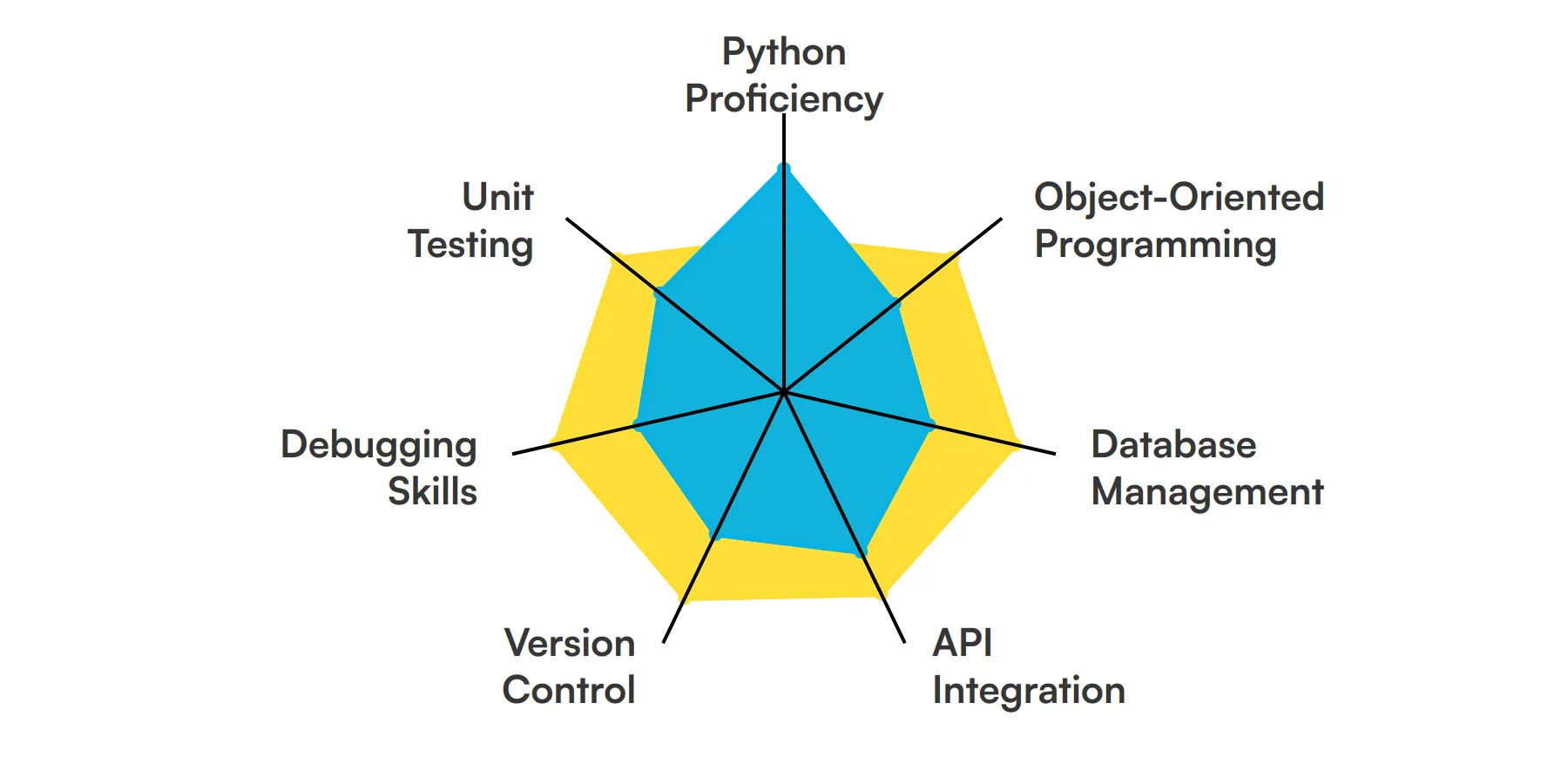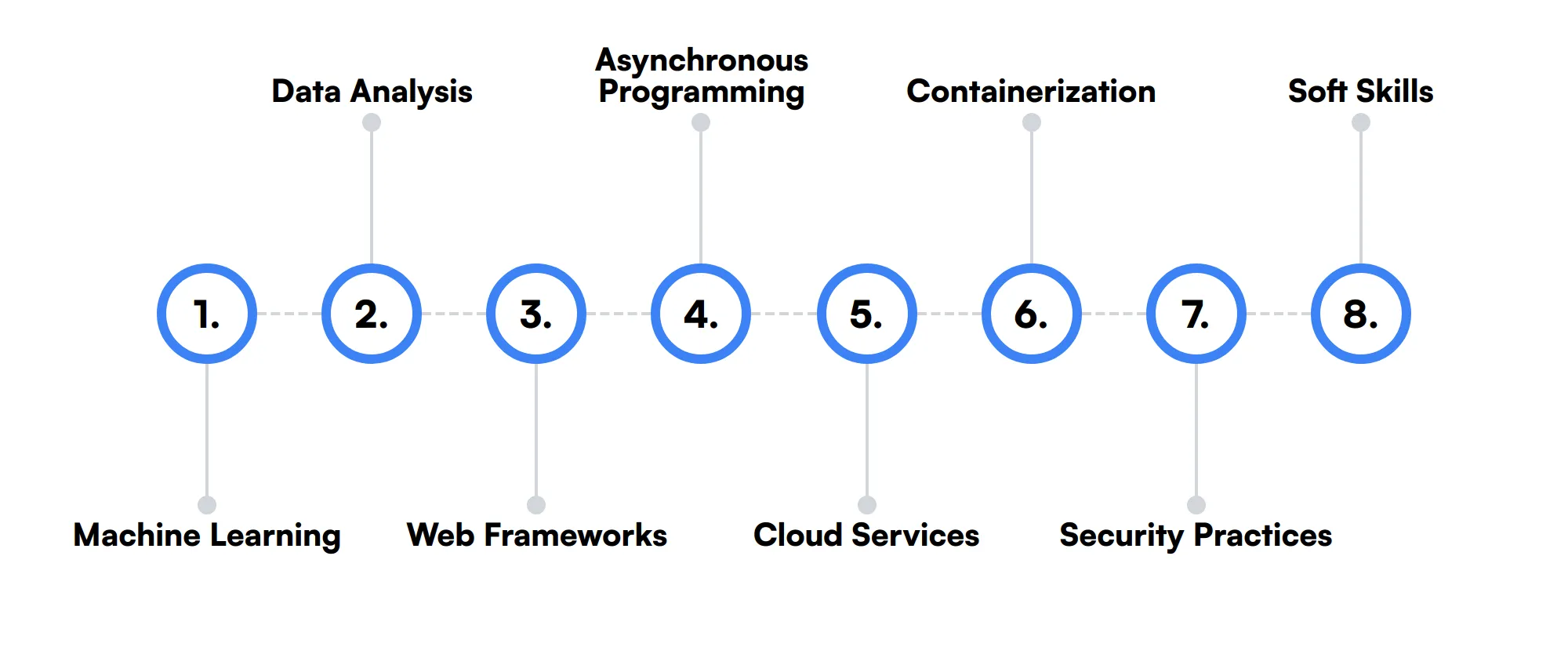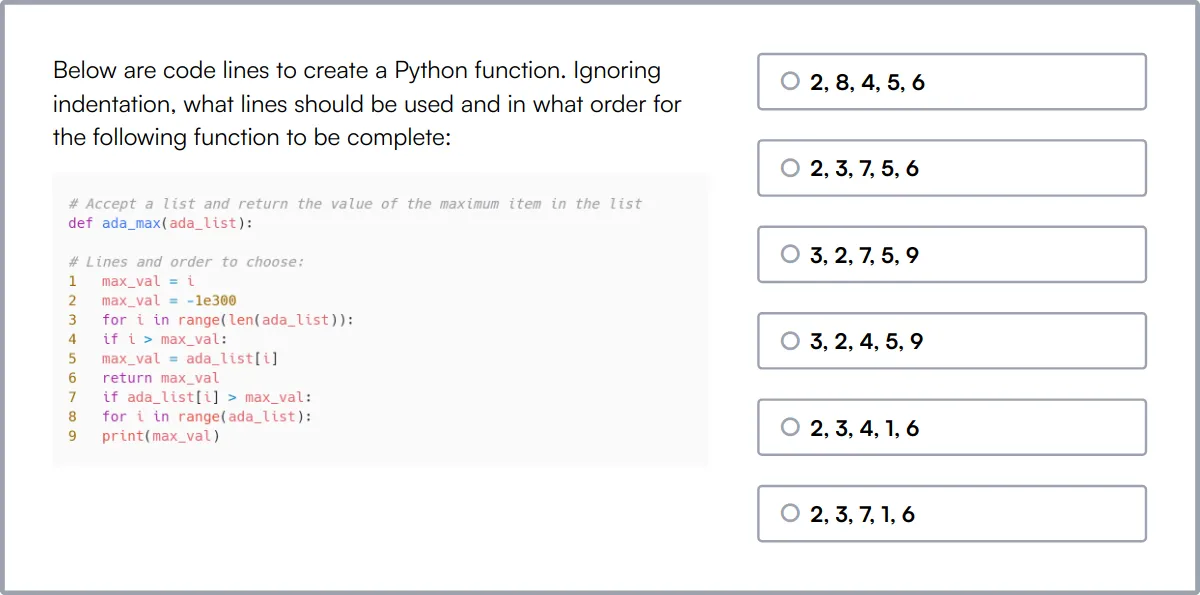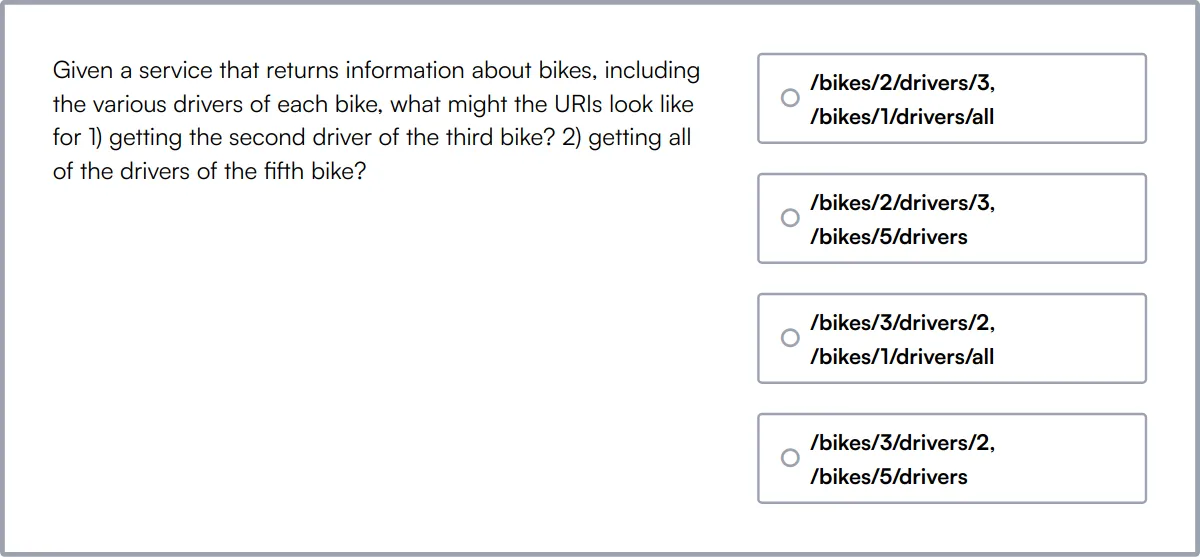Python developers are the backbone of many software projects, providing the necessary skills to build, maintain, and improve applications. They work on server-side logic, ensuring that applications run smoothly and efficiently, and often collaborate with front-end developers to integrate user-facing elements with server-side logic.
Python development skills include proficiency in Python programming, understanding of web frameworks like Django or Flask, and familiarity with databases. Additionally, skills such as problem-solving, debugging, and effective communication are crucial for success in this role.
Candidates can write these abilities in their resumes, but you can’t verify them without on-the-job Python Developer skill tests.
In this post, we will explore 7 essential Python Developer skills, 8 secondary skills and how to assess them so you can make informed hiring decisions.
Table of contents
7 fundamental Python Developer skills and traits
The best skills for Python Developers include Python Proficiency, Object-Oriented Programming, Database Management, API Integration, Version Control, Debugging Skills and Unit Testing.
Let’s dive into the details by examining the 7 essential skills of a Python Developer.

Python Proficiency
A Python developer must have a deep understanding of Python and its libraries. This includes knowledge of syntax, data structures, and basic frameworks like Django or Flask, which are commonly used for web development. Mastery of Python allows the developer to efficiently build and maintain scalable and efficient applications.
For more insights, check out our guide to writing a Python Developer Job Description.
Object-Oriented Programming
Understanding object-oriented programming (OOP) concepts is critical for structuring code effectively in Python. This skill helps in creating reusable code, which is easier to manage and debug. A Python developer uses OOP to design clear modular programs that are optimized for performance and scalability.
Database Management
Proficiency in database systems such as MySQL, PostgreSQL, or MongoDB is essential for a Python developer. This skill involves designing, implementing, and maintaining databases. Effective database management ensures that applications have quick data access and are capable of handling data operations efficiently.
Check out our guide for a comprehensive list of interview questions.
API Integration
Integrating and managing APIs is a common responsibility for Python developers, enabling different software systems to communicate. Whether it's REST or SOAP, understanding how to create and consume APIs is fundamental in developing modern applications that interact with other services seamlessly.
Version Control
Familiarity with version control, particularly Git, is necessary for maintaining code quality and managing changes in collaborative environments. This skill helps Python developers track modifications, revert to previous versions, and efficiently collaborate with others on projects.
Debugging Skills
The ability to identify and fix bugs quickly is essential for maintaining the reliability and performance of applications. Python developers use debugging tools and techniques to ensure their code runs smoothly and meets all operational requirements.
Unit Testing
Writing and maintaining unit tests is crucial for ensuring code quality and functionality over time. Python developers use frameworks like PyTest to create tests that automatically verify that each part of their code behaves as expected before deployment.
8 secondary Python Developer skills and traits
The best skills for Python Developers include Machine Learning, Data Analysis, Web Frameworks, Asynchronous Programming, Cloud Services, Containerization, Security Practices and Soft Skills.
Let’s dive into the details by examining the 8 secondary skills of a Python Developer.

Machine Learning
Knowledge of machine learning frameworks like TensorFlow or PyTorch can be beneficial for Python developers working in data-driven industries to create predictive models and automate decision-making processes.
Data Analysis
Skills in data manipulation and analysis using libraries like Pandas and NumPy are useful for Python developers involved in processing and interpreting large datasets, helping businesses make informed decisions.
Web Frameworks
Experience with specific Python web frameworks such as Django or Flask is valuable for developing robust and scalable web applications. These frameworks provide tools and libraries that simplify the web development process.
Asynchronous Programming
Understanding asynchronous programming and frameworks like asyncio in Python can enhance a developer's ability to handle multiple tasks and improve application performance and responsiveness.
Cloud Services
Familiarity with cloud platforms like AWS, Azure, or Google Cloud can empower Python developers to deploy applications in scalable environments, manage cloud resources, and optimize application performance.
Containerization
Skills in Docker and Kubernetes are increasingly important for Python developers as these technologies allow for the creation of scalable and portable application environments across different computing platforms.
Security Practices
Understanding of security best practices is important for Python developers to protect applications from vulnerabilities and attacks, ensuring data integrity and user privacy.
Soft Skills
While technical skills are paramount, communication, teamwork, and problem-solving are also important for Python developers to effectively collaborate and adapt to changing project needs.
How to assess Python Developer skills and traits
Assessing the skills and traits of a Python developer can be a challenging task, given the wide range of competencies required. From Python proficiency to debugging skills, each aspect plays a significant role in determining a developer's capability. Traditional resumes and interviews often fall short in providing a comprehensive view of a candidate's abilities.
To get a clearer picture, skills-based hiring practices, such as talent assessments, are invaluable. These assessments allow you to evaluate a candidate's proficiency in key areas like Object-Oriented Programming, Database Management, and API Integration. Adaface on-the-job skill tests can help you achieve a 2x improved quality of hires by focusing on real-world scenarios and practical skills.
By incorporating assessments that cover Version Control, Debugging Skills, and Unit Testing, you can ensure that the candidate is well-rounded and capable of handling the demands of the job. This approach not only saves time but also provides a more accurate measure of a developer's potential to succeed in your organization.
Let’s look at how to assess Python Developer skills with these 6 talent assessments.
Python Online Test
Our Python Online Test evaluates a candidate's ability to work with Python's core features including data structures, file management, and object-oriented programming.
The test assesses their understanding of Python fundamentals, error handling, scripting, and the use of debugging tools to troubleshoot code.
Successful candidates demonstrate a strong grasp of both functional and object-oriented programming approaches in Python, as well as effective database manipulation skills.

Loadrunner Online Test
Our Loadrunner Online Test measures a candidate's proficiency in using Loadrunner for performance testing and monitoring of web applications.
The test evaluates knowledge in Loadrunner basics, script enhancement, performance analysis, and error debugging.
Candidates who score well are adept at managing complex testing scenarios and optimizing application performance under varied conditions.
MySQL Online Test
The MySQL Online Test is designed to assess a candidate's expertise in SQL queries, database design, and data manipulation using MySQL.
It covers key areas such as normalization, indexing, joins, and the use of stored procedures and triggers in database management.
High-scoring individuals excel in designing efficient, scalable databases and can effectively implement advanced data management techniques.

REST API Test
Our REST API Test evaluates a candidate's ability to design and interact with RESTful APIs, crucial for modern backend services.
The assessment includes understanding of REST API basics, API design, and best practices along with coding skills to implement API solutions.
Candidates proficient in these areas are capable of creating scalable and maintainable API architectures that effectively handle data flow and integration.

Git Online Test
The Git Online Test assesses a candidate's knowledge and skills in using Git for version control, an essential tool for collaborative software development.
This test challenges candidates on repository management, branching, merging, and conflict resolution.
Those who perform well are able to efficiently manage code changes and collaborate effectively with development teams.
Python & Django Online Test
Our Python & Django Online Test assesses a candidate's proficiency in Python programming and their ability to use the Django framework for web development.
The test evaluates Python fundamentals, Django's MVC structure, and the ability to perform CRUD operations using Django ORM.
Candidates who excel in this test are well-versed in building secure, scalable web applications using Django.
Summary: The 7 key Python Developer skills and how to test for them
| Python Developer skill | How to assess them |
|---|---|
| 1. Python Proficiency | Evaluate the candidate's ability to write and understand Python code. |
| 2. Object-Oriented Programming | Assess understanding and application of OOP principles in projects. |
| 3. Database Management | Check proficiency in handling and structuring various databases. |
| 4. API Integration | Review skills in connecting and utilizing external software interfaces. |
| 5. Version Control | Observe usage of tools like Git to manage code versions. |
| 6. Debugging Skills | Test ability to identify and fix software bugs. |
| 7. Unit Testing | Determine capability to write tests and validate code units. |
Python Online Test
Python Developer skills FAQs
What are the key skills to look for in a Python developer?
Key skills include Python proficiency, Object-Oriented Programming, Database Management, API Integration, Version Control, Debugging, Unit Testing, Machine Learning, Data Analysis, Web Frameworks, Asynchronous Programming, Cloud Services, Containerization, Security Practices, and Soft Skills.
How can I assess a candidate's Python proficiency?
You can assess Python proficiency through coding tests, technical interviews, and reviewing their past projects or contributions to open-source projects.
Why is Object-Oriented Programming important for Python developers?
Object-Oriented Programming (OOP) helps in organizing code into reusable and modular components, making it easier to manage and scale applications.
What methods can be used to evaluate a candidate's debugging skills?
Evaluate debugging skills by presenting real-world coding problems, asking them to identify and fix bugs, and discussing their approach to troubleshooting.
How do I test a candidate's knowledge of version control systems?
Ask about their experience with Git, request examples of their workflow, and present scenarios where they need to resolve merge conflicts or manage branches.
What is the significance of API integration in Python development?
API integration allows Python applications to communicate with other services and systems, enabling data exchange and functionality extension.
How can I gauge a candidate's experience with web frameworks?
Inquire about their experience with frameworks like Django or Flask, ask for examples of web applications they've built, and discuss their understanding of MVC architecture.
What soft skills are important for a Python developer?
Important soft skills include communication, problem-solving, teamwork, adaptability, and time management.

40 min skill tests.
No trick questions.
Accurate shortlisting.
We make it easy for you to find the best candidates in your pipeline with a 40 min skills test.
Try for freeRelated posts



